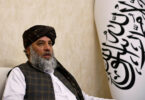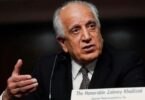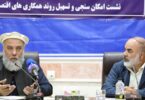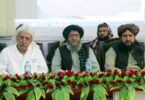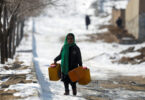KABUL (Tolo News): President Ghani arrived in Mazar-e-Sharif city, Balkh province, on Wednesday morning amid challenging security situation in the northern provinces. Ghani’s adviser on security and political affairs Mohammad Mohaqiq and former mujahideen commander Juma Khan Hamdard are accompanying the President in the trip.
Former vice president Marshal Abdul Rashid Dostum also traveled to Mazar-e-Sharif. A security meeting will be held in Marzar-e-Sharif with the presence of Marshal Dostum, former Balkh governor Atta Mohammad Noor and security officials in the province, an official said. The meeting will focus on coordination between the defense and security forces and the mobilization of the public uprising forces and launching clearance operations in cities that have fallen to the Taliban, a source said.
Zaranj, capital of western Nimroz, Aybak, capital of northern Samangan, Taloqan, capital of northern Takhar, Sheberghan, capital of Jawzjan and Sar-e-Pul, capital of northern Sar-e-Pul province so far fallen to the Taliban. Meanwhile, President Ashraf Ghani held separate meetings with political leaders about their decision to form a command center for public uprising forces in the fight against the Taliban. The discussions focused on the details of the plan, sources said.
The decision was made in a meeting of political leaders with President Ghani. The meetings that followed the leaders’ session included Ghani’s meeting with former vice president Mohammad Karim Khalili, Second Vice President Mohammad Sarwar Danesh, presidential adviser and head of People’s Islamic Unity Party of Afghanistan Mohammad Mohaqiq and a senior member of Hizb-e-Wahdat, Sadiq Mudabir, who all have an influence on central parts of Afghanistan, sources said.
More meetings are expected to occur between President Ghani and political leaders from various parts of the country to discuss the details of mobilizing public forces under the command center, sources said. Meeting was also attended by Marshal Abdul Rashid Dostum, the former vice president, who was reportedly one of the political figures to have suggested the plan. Dostum’s office said that the president has not provided a clear response regarding Dostum’s trip to the north and leading the war against the Taliban.
“We are waiting for the president to announce the date for the trip, equipment and supplying of Marshal Dostum to the north,” Dostum’s spokesman Ihsan Nairo said. His office also said that Dostum is in Kabul, rejecting reports that he had traveled to the northern province of Balkh. “Political leaders of the country unanimously announced their support for the system and the Afghan security forces. They also stressed that defending the country is the duty of all Afghan citizens,” a presidential spokesman Latif Mahmoud said.
Some politicians showed their support to a move to mobilize public uprising forces against the Taliban, saying it will prove effective in boosting unity in the fight against the group. However, they expressed their concern over a lack of healthy management of the resistance forces. “The move by the government for public mobilization is good, but the practical framework should be reviewed. The public forces should follow guerrilla warfare,” said Abdul Hafiz Mansour, a member of the negotiating team of the Islamic Republic of Afghanistan.
“Herat is a role model. The consensus in Herat for supporting the Republic, the security and defense forces is there, and this has boosted the morale,” Herat governor Abdul Saboor Qani said. “We hope that the Herat-like consensus is implemented across Afghanistan.” The political leaders also discussed the size of the public uprising forces. This comes as five provincial capitals have fallen to the Taliban while heavy fighting has gripped other capital cities in various parts of the country.

